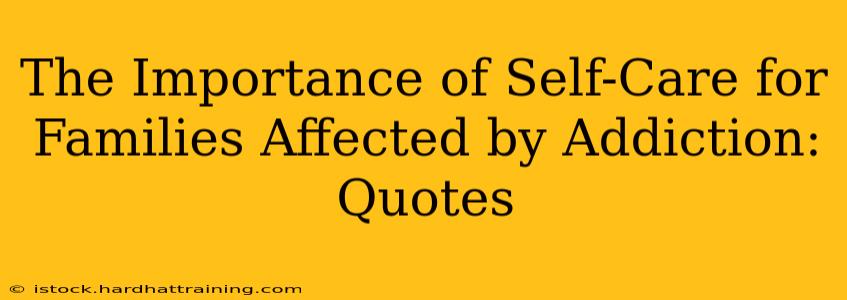Addiction impacts the entire family system, leaving loved ones feeling overwhelmed, stressed, and depleted. While supporting a person struggling with addiction is crucial, neglecting your own well-being can lead to burnout and hinder your effectiveness in helping your family member. This article explores the vital importance of self-care for families affected by addiction, incorporating insightful quotes and practical advice.
What is Self-Care and Why is it Important for Families Affected by Addiction?
Self-care isn't selfish; it's essential. It's about prioritizing your physical, emotional, and mental health. For families grappling with addiction, self-care isn't a luxury, it's a necessity. Without it, you risk becoming overwhelmed, experiencing health problems, and ultimately hindering your ability to support your loved one. As the saying goes, "You can't pour from an empty cup."
"The best way to take care of others is to take care of yourself first." - Unknown
How Does Addiction Affect Families?
Addiction wreaks havoc on family dynamics. It disrupts routines, creates financial strain, and erodes trust. Family members often experience:
- Emotional distress: Anxiety, fear, anger, sadness, guilt, and shame are common.
- Financial burdens: Treatment costs, lost income, and legal fees can be significant.
- Relationship strain: Communication breakdowns, resentment, and conflict damage family bonds.
- Social isolation: Families may withdraw from social activities due to shame or exhaustion.
- Physical health problems: Stress can manifest physically through headaches, sleep disturbances, and weakened immunity.
What Types of Self-Care Are Beneficial?
Self-care is multifaceted and personalized. Finding activities that nurture you is key. Examples include:
Physical Self-Care:
- Regular exercise: Even a short walk can boost your mood and reduce stress.
- Healthy eating: Fuel your body with nutritious foods to improve energy levels.
- Sufficient sleep: Aim for 7-9 hours of quality sleep each night.
- Medical checkups: Regular checkups help detect and address any health concerns early.
Emotional Self-Care:
- Journaling: Process your emotions and thoughts through writing.
- Meditation or mindfulness: Practice relaxation techniques to manage stress and anxiety.
- Therapy or counseling: A therapist can provide support and guidance in navigating the challenges of addiction.
- Connecting with supportive friends and family: Share your experiences with trusted individuals.
Mental Self-Care:
- Setting boundaries: Learn to say "no" to protect your time and energy.
- Engaging in hobbies: Rediscover activities you enjoy to boost your mood.
- Learning new skills: Expand your knowledge and challenge yourself.
- Taking breaks: Schedule downtime to relax and recharge.
How Can Families Find Support?
You don't have to navigate this alone. Many resources can help families affected by addiction:
- Support groups: Al-Anon and Nar-Anon offer support and understanding for families of alcoholics and addicts.
- Therapy: Individual or family therapy can provide guidance and support.
- Addiction treatment centers: Many centers offer family support programs.
- Online resources: Websites and online forums offer information and connection.
What are Some Practical Self-Care Tips for Families?
Prioritize Sleep: Aim for 7-9 hours of sleep nightly, even if it means adjusting your schedule.
Schedule "Me Time": Even 15 minutes a day dedicated to relaxation can make a difference.
Engage in Physical Activity: Find an activity you enjoy, whether it's walking, yoga, or swimming.
Connect with Support Systems: Talk to trusted friends, family, or a therapist.
Learn to Say No: Protect your energy by setting boundaries and saying no to requests that drain you.
Practice Mindfulness: Take time each day to focus on your breath and be present in the moment.
What are Common Mistakes Families Make Regarding Self-Care?
- Ignoring their own needs: Putting the needs of the person with addiction above their own.
- Feeling guilty about taking time for themselves: Believing that self-care is selfish.
- Not seeking professional help: Trying to handle the situation alone.
- Overcommitting: Taking on too much responsibility, leading to burnout.
- Neglecting physical and emotional health: Ignoring warning signs of stress and exhaustion.
Conclusion: Self-Care is Not Selfish, It's Survival.
Remember, taking care of yourself isn't selfish; it's essential for your well-being and your ability to support your family member. Prioritizing self-care allows you to approach the challenges of addiction with greater strength, resilience, and effectiveness. By incorporating these strategies and seeking support, families can navigate the difficulties of addiction while nurturing their own well-being. Remember, you deserve to take care of yourself.
